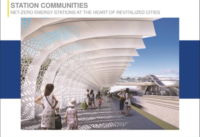About $3 billion and 119 miles’ worth of track construction is underway or under contract on California’s planned high-speed route that, ultimately, would stretch between Sacramento and San Diego. At the same time, however, the Federal Transit Administration’s deferral of a $647-million grant for electrification of a Bay Area commuter rail line—considered a vital part of the $64-billion high-speed-rail system—indicates potential, possibly partisan-based new opposition.
In February, a group of Republicans wrote a letter to new U.S. Dept. of Transportation Secretary Elaine Chao urging her to defer the grant, citing opposition to the high-speed-rail project, and she agreed. As a result, the Peninsula Corridor Joint Powers Board reached an agreement with its major contractors to delay construction starts, originally slated for March, to June.
Balfour Beatty Infrastructure Inc. is the main contractor for electrification of the 52-mile project. The firm would convert the diesel-based system into an electrified one with positive train control, increasing capacity to 110,000 from 65,000 daily riders, said Joseph Reed, Balfour Beatty vice president of transit, speaking to attendees of the US High Speed Rail Association at a conference just days after the FTA deferral.
“We are trying to accelerate design and be prepared,” he said of the delay.
Jeff Morales, CEO of the California High Speed Rail Authority, said that while “we’re still figuring out what it means,” the deferral wouldn’t impact construction on the southern segment of the system. “The next 60 days will bring clarity” regarding a Plan B for the Caltrain piece, he added.
Bay Area officials have worked for years to raise the funds for Caltrain, and the FTA grant, which had been approved, was the last piece. In a press release, Caltrain noted that the deferral means “the contractors will likely require the utilization of up to $20 million in project contingency that otherwise would have been available for construction-related expenses in the future.”
Caltrain serves some three million people and 19 cities, including Silicon Valley.
Morales gave conference attendees an update on the overall high-speed rail construction, which is underway in the Central Valley with three design-build contracts, held by Tudor-Perini Corp., a Dragados-Flatiron joint venture, and Ferrovial. Ron Tutor, CEO of Tutor-Perini Corp., described his firm's $1-billion, 29-mile contract, saying it includes 15 bridges, 2 million cu yd of earthwork, a mile-long trench and 8,500 linear ft of elevated viaduct. He added that he ha been skeptical of the 30% SBE goal, "the largest commitment I have ever seen. But we have achieved it."
Responding to the ongoing public criticism of the project costs, Morales noted: "Our estimate is $64 billion total. That includes $11 billion worth of contingency funds. The goal is not to spend it. With private-sector input, I believe our costs will go down."
Tutor added that the system would cost twice as much to build in places like New York City, and said his team is building its section at about $500,000 per mile.
Morales said environmental clearance work for the rest of the system is underway, and contracts should be out for bid next year on more sections toward San Jose. "We are also procuring the train systems and are seeking an advisor and early operator," he said.




Post a comment to this article
Report Abusive Comment